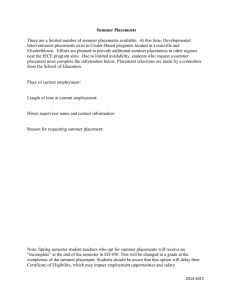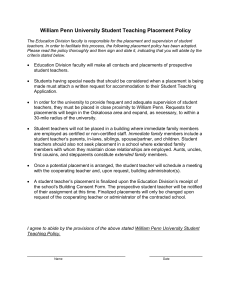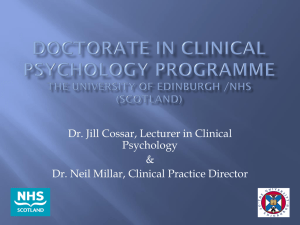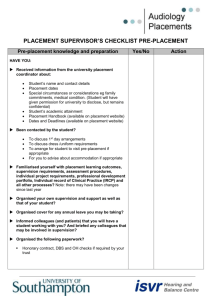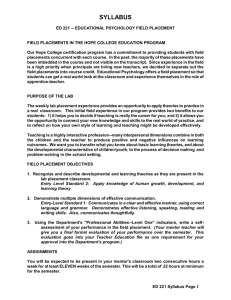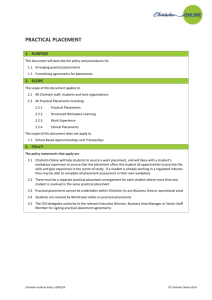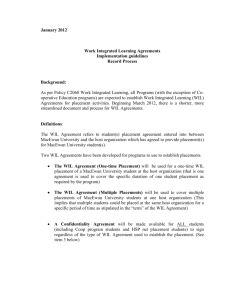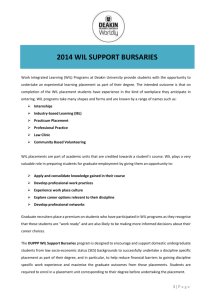Refereed Paper #4
advertisement
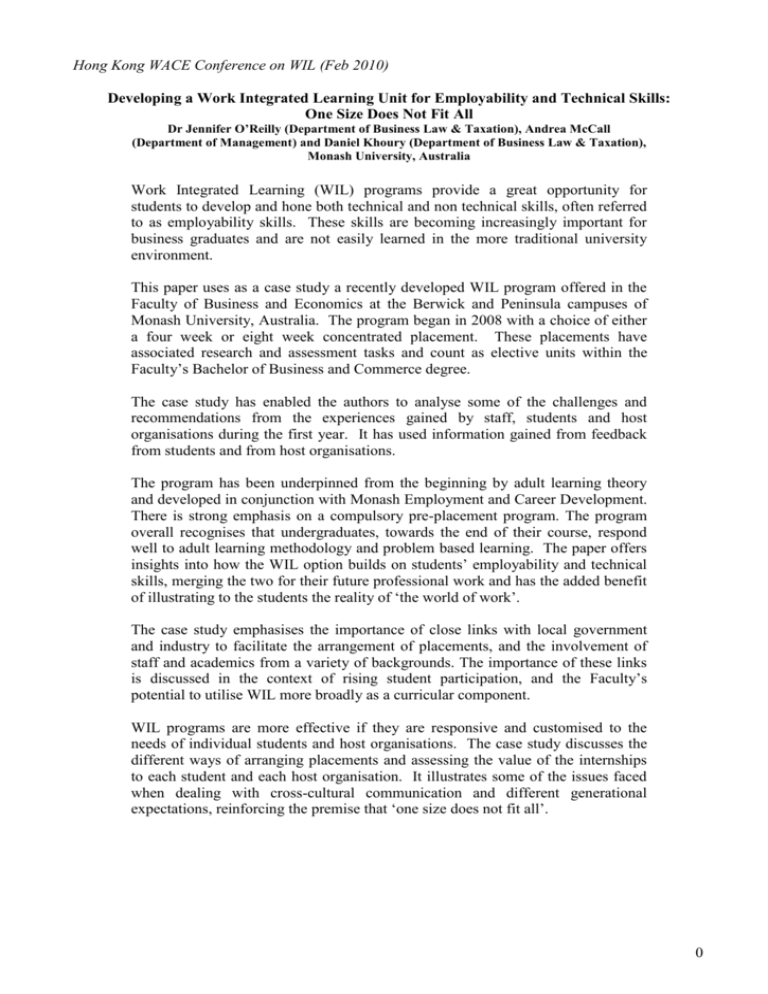
Hong Kong WACE Conference on WIL (Feb 2010) Developing a Work Integrated Learning Unit for Employability and Technical Skills: One Size Does Not Fit All Dr Jennifer O’Reilly (Department of Business Law & Taxation), Andrea McCall (Department of Management) and Daniel Khoury (Department of Business Law & Taxation), Monash University, Australia Work Integrated Learning (WIL) programs provide a great opportunity for students to develop and hone both technical and non technical skills, often referred to as employability skills. These skills are becoming increasingly important for business graduates and are not easily learned in the more traditional university environment. This paper uses as a case study a recently developed WIL program offered in the Faculty of Business and Economics at the Berwick and Peninsula campuses of Monash University, Australia. The program began in 2008 with a choice of either a four week or eight week concentrated placement. These placements have associated research and assessment tasks and count as elective units within the Faculty’s Bachelor of Business and Commerce degree. The case study has enabled the authors to analyse some of the challenges and recommendations from the experiences gained by staff, students and host organisations during the first year. It has used information gained from feedback from students and from host organisations. The program has been underpinned from the beginning by adult learning theory and developed in conjunction with Monash Employment and Career Development. There is strong emphasis on a compulsory pre-placement program. The program overall recognises that undergraduates, towards the end of their course, respond well to adult learning methodology and problem based learning. The paper offers insights into how the WIL option builds on students’ employability and technical skills, merging the two for their future professional work and has the added benefit of illustrating to the students the reality of ‘the world of work’. The case study emphasises the importance of close links with local government and industry to facilitate the arrangement of placements, and the involvement of staff and academics from a variety of backgrounds. The importance of these links is discussed in the context of rising student participation, and the Faculty’s potential to utilise WIL more broadly as a curricular component. WIL programs are more effective if they are responsive and customised to the needs of individual students and host organisations. The case study discusses the different ways of arranging placements and assessing the value of the internships to each student and each host organisation. It illustrates some of the issues faced when dealing with cross-cultural communication and different generational expectations, reinforcing the premise that ‘one size does not fit all’. 0 1. Introduction The Work Integrated Learning (WIL) units described in this paper form optional (elective) units offered within the Bachelor of Business and Commerce (BBusCom) degree at two metropolitan campuses (Berwick and Peninsula) of Monash University (Australia). Monash is Australia’s largest university with more than 55,000 students across six campuses in Victoria, plus overseas campuses in Malaysia and South Africa. The Faculty Business and Economics (BUSECO), which offers the BBusCom has 18,000 undergraduate students, of whom approximately 2,000 are enrolled in the degree at the Berwick or Peninsula campuses. Prior to 2008, BUSECO had very limited programs to actively involve BBusCom students from these campuses in relevant professional work experience as part of their course. At the Berwick campus, there was a program seeking to place students with an organisation for two weeks (10 working days), and at Peninsula the faculty acted as a conduit to identify interested students for occasional and ad hoc temporary positions with a small number of local organisations. However it was evident that the uncoordinated nature of these programs was acting as a disadvantage to both students and host organisations. There was a need to draw the two programs together to increase opportunities for students and to ensure that there was the appropriate level of academic rigour and evaluation undertaken. A unit already existed within the BBusCom at another Victorian campus, and the initial action was to make this available to students enrolled at the Berwick and Peninsula campuses. BEW3100 Work Placement Program (BEW3100)) involves 8 weeks of relevant work experience. It is the equivalent of two standard units and is only open to students in the final year of their degree with a record of high academic achievement. The assessment involves a significant academic research project of 7,000 words and assessment by the host organisation. While attractive to some students, BEW3100 was considered unlikely to fill the needs of a significant group of students, particularly those who did not have room in their course progression to fit a double-unit, counting as it does for two units. Having BEW3100 as the sole WIL offering was also 1 seen as too inflexible to meet the needs of different students, particularly those from a variety of cultures and disciplines with different needs and aspirations. Therefore, it was decided to establish also a new unit, BEW3101 Business Internship (BEW3101), which would count as one unit within the BBusCom degree. Being a new unit, the Faculty had a clean slate; the opportunity to develop a new unit that would endeavour to maximise the educational benefits, at least to the extent permitted by available resources. Recent media reports (Ferrari, 2009; Lebihan, 2009) together with reports by IBM (2008) and Boston Consulting Group (2006) indicate the need for substantial reform in areas of skills and workforce development. The Council of Australian Government’s Reform Council reports that 44% of working age Australians are not meeting basic literacy standards and that university graduates were not meeting the expectations of their employers in areas of written and oral communication, problem solving and lateral thinking ( Ferrari 2009, ). The Business Council of Australia is also calling for greater business involvement on campus, more input into curricula and increased work experience and internship opportunities (Lebihan, 2009). These reports have increased the impetus for programs such as ours. Following the recommended order of considerations for planning adult education (Vella, 1994), this paper first addresses issues relevant to who the student participants were and why they were participating, before moving to the curriculum issues of how and what learning was intended to occur (including assessment thereof). Therefore, this paper proceeds with a brief explanation of the ways in which the two WIL units were developed to accord with academic theories and approaches to adult learning. Section three includes the authors’ reflections on the educational benefits expected and insights gained from the assessment of the internship experiences. The final section draws conclusions together with suggestions for future action. While reference is made to BEW3100 (the double-unit), the following analysis deals primarily with BEW3101, the newly developed unit. 2. Developing the new WIL elective for BBusCom students When creating the new WIL elective for undergraduate business students, there was a desire to apply relevant academic theory. This section explains links between academic theory on both adult learning 2 and the new WIL offering. Utilisation of existing resources and expertise within Monash was also a priority, leading to the involvement of the university’s Employment and Career Development unit (ECD) from the outset. a. Adult learning One of the early decisions was that BEW3101, like BEW3100, would be restricted to final year students (i.e. those who had completed two years of their degree). By the start of their final year, students have chosen their ‘major’ and have passed units specific to that major, giving them at least some academic experience in the area for which they seek an internship. As the students involved were expected to be at least 20 years old by the time they reached the final year of their degree, principles relevant to teaching adults were deemed relevant in planning and teaching the new unit. The findings of Cross (1981), Knowles (1970), Knowles, Holton and Swanson (1998), Rachal (2002) and others provide useful sources in considering beliefs about adult learners. Knowles (1970) developed a theory based on assumptions about the nature of the adult learner, focussing on adult learners’ independence, experience, motivation to learn, problem- and task-centredness, and their need for immediate practical application of their learning (Knowles, 1970, 1984). Krajnc (1985) broadened the definition to include also the social, flexible and dynamic natures of adult education. Drawing from literature on adult learning, some common threads were drawn together for use in making informed decisions in developing BEW3101. In particular, the literature advocated: teachers’ reflection on the learners’ characteristics (Vella, 1994; Cross, 1981); group learning and facilitation (Bhola, 1998); and problem based learning, learning within a context and self-application of the concepts learned (Bhola, 1998; Knowles, 1970, 1984). (i) Teachers’ reflection on the learners’ characteristics As Ross-Gordon (2002) found, researchers on adult education generally agree there is no unique way to teach adults. Central to most research on teaching adults is some degree of reflection by teachers on their beliefs about the learners, the learning process and the teaching-learning relationship (RossGordon, 2002). This is probably true of nearly all research on effective teaching; it is the context that 3 alters, particularly the characteristics of the learners, the teachers, the unit content and the teacherlearner-content relationship. University students tend to learn through a series of self-selected subjects, towards a chosen degree qualification, thus learning through a series of episodes rather than a graded, continuous standard program (Bhola, 1988). This is certainly the case for BBusCom students, who complete 24 units for their degree, some of which are compulsory, others selected according to the student’s chosen major/s and the remainder elective subjects, selected by the student. It was in the last category of units (electives) that BEW3101 (and BEW3100) would fit. Adult learners come with external and internal influences or baggage (Mahoney, 1991), including various learning preferences, experiences and motivations. Students in the BBusCom are from a wide variety of backgrounds (language, cultural, and educational) and have differing prior experiences of employment or work. Many undergraduate students today are perceived to be time poor, with external pressures on their time in addition to the time the university expects to be spent on their studies. It was decided to run BEW3101 only during summer semester, when students might more easily fit the 20 days of internship placement around their other activities. An early decision was that BEW3101 (like BEW3100) would be for credit, in the sense that students would be completing a unit towards their degree. One consequence of this decision was that the assessment tasks associated with the unit had to meet the requirements of various Faculty committees in terms of academic rigour. This resulted in assessment comprising the following: pre-placement seminars (ungraded, hurdle assessment task); oral presentation (20% of final mark); research assignment up to 4,000 words (80% of final mark) completion of the internship placement (20 days) with satisfactory feedback by the host organisation (ungraded, hurdle assessment task). Students participating in the program were anticipated to be highly motivated. Setting aside 20 working days during summer, plus time to complete the assessment tasks, is a large commitment for the students, as summer is more often a time for them to enjoy the holidays and/or maximise their earnings to save for the year ahead. A clear benefit would be not only the completion of a unit 4 towards their degree, but a period of professionally relevant work experience to add to their résumé and benefit their search for graduate positions. The timing of the offering was also a motivational factor, as the students would normally be looking towards graduate employment opportunities within the next 12 months (or perhaps within the next 2-3 months for graduate recruitment programs by larger employers), so they were likely to be focused on improving their employment prospects through the WIL program. (ii) Group learning and facilitation Bhola (1998) emphasises the importance of group learning and facilitation for adult learners. The preplacement seminars, led by ECD (see section 2b, below), the actual work placements and the reflective aspects of the oral presentation and research assignment assessment tasks provided ideal opportunities for facilitated learning. For group learning, whole-class and small group activities were built into the pre-placement seminars, and online discussion areas were created on a special website dedicated to the summer semester students. A peer-feedback aspect was built into the oral presentation assessment task. (iii) Problem based learning, learning within a context and self-application of the concepts learned Knowles, Holton and Swanson (1998) found adult learners to be self-directed, their learning being individually constructed and affected by prior experience, and found adult learners prefer problemsolving approaches. Practical-based placements, like those anticipated for BEW3101, are ideally suited for students to construct their own learning as they endeavour to apply their existing knowledge (from other subjects in their degree and university and beyond) to the tasks required in their placement. As the WIL offering forms a very practical element in this business degree, the education involved can be described as vocational or professional in nature. This might be expected to result in greater emphasis being given to essential skills and abilities compared to essential values (Bhola, 1988), and fits well with the aim to improve students’ employability skills. Bhola (1998) also emphasises the importance for adult learners of learning within a context and selfapplication of the concepts learned. Learning within a context is an integral part of meaningful work placements. During the internship or work placement, students would be faced with processes and 5 tasks new to them, but which are relevant to the students’ planned profession. As an example, students undertaking an internship in accounting might be expected to complete clients’ basic taxation returns, requiring them to not only recall and apply definitions and interpretations covered in their taxation law unit, but also to master the processes by which the accounting firm prepares the necessary returns. BEW3101, like BEW3100, has a written research project as a significant graded assessment task. This task requires students to address a question or issue relevant to their individual work placement situation; to form individual understanding of how relevant academic theories or approaches taught at university apply (or not) to a real world situation. In this task, students are expected not only to create a solution to their chosen research question, but to explicitly reflect on their learning experience during the internship or work placement. b. Role of ECD & need for pre-placement learning ECD is an organisational unit dedicated to and centred on employment prospects for students. It is funded by the administrative centre of the university, and has staff working on each campus. ECD has run for many years a set of parallel programs for work-readiness (e.g. workshops on résumés, job-finding, interview techniques). The new unit provided an opportunity to include, as part of the unit, activities to develop students’ work-readiness skills. These activities were designed as a mandatory part of BEW3101, to operate in the form of a series of pre-placement seminars. Utilising their skills and expertise in this area, it was decided that the pre-placement seminars would be developed and taught by ECD. The first round of pre-placement seminars was held by ECD in November 2008, followed then by the students’ placements for their internship. These employability skills activities were designed to be conducted over four separate days, with high levels of student interaction and group-work, and covering the following topics: Career planning; Résumés and cover letters; Employers’ expectations regarding employability skills; Networking skills; and Interview skills with a mock interview for each student. 6 In addition to these bolt-on activities (Cranmer, 2006), there was also explicit embedding and integration of verbal and written communication skills within the graded assessment tasks, together with a broader of range employability skills assessed in the template assessment form to be completed by each student’s host organisation.. 3. Reflections from case study a. The first year of BEW3101 The first intake of students was for summer 2008-2009. 17 students completed the unit, compared to the slightly larger number of students matched to placements and the considerably larger number initially interested in undertaking BEW3101.i (i) Student profile of first intake In summary, the first intake had the following profile: (a) Nine were international students and eight were domestic. (b) Students majoring in accounting formed the largest group. (c) The type of business experience sought by the students reflected the majors undertaken. Consequently, the largest group sought experience in the area of accounting. (d) Only four of the 17 students found their own placement. This was so even though students applying for the unit were encouraged to find their own placement, and those who had made genuine efforts were prioritised for assistance ahead of those who had not. (ii) Host organisation profile A wide variety of organisations were selected for the placements (see Appendix A). The host organisations were generally small to medium enterprises and were mostly situated close to either of the two campuses. (iii) Placement experience Many students completed a project as part of their placement. For example, one student, majoring in tourism and accounting, assisted her host organisation (an events management business) to conduct several events, such as a sand sculpting event at a local beach and a popular Christmas celebration in central Melbourne. Another student, who was majoring in accounting and finance, fulfilled his 7 placement in the finance division of a local council and reported on that division’s importance to the governance of their municipality. Whatever the form of the placement experience, the student was required to write a report on their placement (worth 80% of the final mark in the unit) and make a verbal presentation on their experience (worth 20% of the final mark in the unit). The written reports and verbal presentations gave each student opportunities to discuss his or her personal experiences during the placement, and resulting in uniformly enthusiastic comments about the placments. Students feedback about the pre-placement seminars was also sought informally after the presentations were completed. The students’ comments here were more mixed: some thought the pre-placement seminars should have less content; others thought several of the topics covered could be expanded. All students agreed, however, that the mock interviews were very worthwhile. (iv) Host organisation feedback At the conclusion of the placement, host organisations were required to complete an assessment of the student’s performance during the placement. This assessment required the host organisation to scale the student’s performance against a series of skills and attributes, mostly linked to nontechnical ability or employability skills (Cotton, 1993). The questions and the scale are set out in Appendix B. Using the response scale (out of 7) as a mark, the average mark across the student cohort for each question can be seen in Appendix C. While Appendix C shows that the host organisations were well satisfied with the performance of the students (the overall average mark was 6.3 out of 7), the two areas of most concern were the oral communication and interpersonal skills of the students. Appendix D shows that it is in these two areas that there was a discernible difference between the international and the domestic students, with host organisations rating the former considerably below the latter.ii This is clearly an area for concern requiring action for the future. Given the sizable portion of international students who are attracted to the unit, it is in the interests of such students (and the host 8 organisations who will provide placements for them) that their oral communication and interpersonal skills be improved. The host organisations were also invited to provide written comments on the placement experience. Most of the comments were positive and rated the students highly on enthusiasm and quality of work (see summary table in Appendix E). However there were a number of negative comments related to language skills and a perceived lack of confidence. Despite these negative comments, the overall satisfaction of host organisations with the experience was shown by 15 of the 16 host organisations indicating that they would provide future placements. (v) Student results All 17 students successfully passed the unit. Three students attained a High Distinction, six attained a Distinction, six attained a Credit and two attained a Pass. These results show that the students performed above the norm for undergraduate units at Monash University and for units within BUSECO. b. Reflections on the first year experience The view of the unit administrators is that the evidence shows the unit generally achieved its objectives for both the students and the host organisations and met the criteria for successful WIL. However, that evidence revealed some areas of concern that will need to be addressed. These were: 1. Over-reliance by students on the Faculty to find a suitable placement. Even though it is stressed that students should seek to obtain their own placement, and there is an in built incentive for students to genuinely try to do so, less than 24% of students successfully found their own placement. 2. Deficiency in the oral communication and interpersonal skills of some students. As was noted above, this was the main concern expressed by host organisations. As was also noted, this presented a bigger problem for international students. Despite these concerns, nearly all host organisations in the first intake indicated that they would participate in future years. It is also worth noting that for the second year intake (in which 9 placements will occur over summer 2009-2010) placements have increased significantly from 17 to 30 in BEW3101 (and from four to seven in BEW3100). 4. Conclusion This paper has sought to give an insight into the first year of operation of a new WIL unit at the Berwick and Peninsula campuses of Monash University. By explaining the rationale behind the program in the areas of skills and employment development, the authors have also tried to explain some of the issues we have faced with trying to implement one style of program delivery across all disciplines and across both domestic and international students. Clearly one size does not fit all. More work needs to be undertaken prior to the placement, with a far greater emphasis on oral and communication skills, particularly for international students. Greater encouragement needs to be given to those students who pursue and secure their own placements. As a result of the appointment of a highly competent and engaged full time officer based between the Berwick and Peninsula campuses, the student participation rates have been increased for 2009/2010 and the types of organisations participating in the program have also been expanded. This has enabled us to ‘tailor make’ more of the placements by ensuring the students have more personalised preemployment training and increased exposure to what the host organisations expect before beginning the placement. We anticipate that the fall out rate will be lower as a result. However like for any new program the team is still learning, and is also drawing on an economy emerging from a global downturn; an economy where the job market is still unpredictable and unlikely to stabilise for another 12 months or more. There is still work required towards ensuring that these students graduate with the best possible skills and understanding for the workforce that awaits them – in other words to be ‘workforce ready’ regardless of their discipline. i 26 students submitted expressions of interest to enrol in the unit following information sessions held at both the Berwick and Peninsula campuses. The major reason for not proceeding with the enrolment was a conflict with summer travel plans. Two of the enrolled students withdrew early (after receiving a placement); one for health reasons and the other found he had over-committed himself for the summer semester. ii This contrasts to questions relating to technical skills, where international students’ average was considerably higher than that of domestic students. 10
